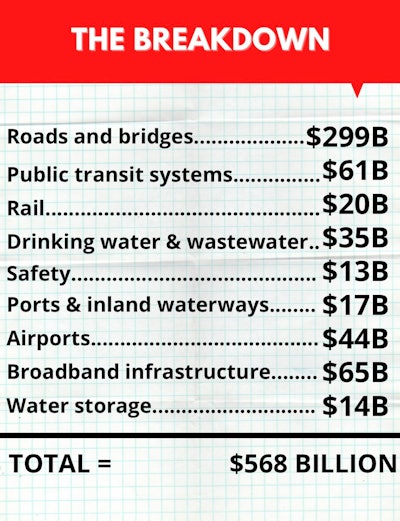
Senate Republicans on Thursday unveiled their $568 billion infrastructure package – a counter proposal roughly 75% smaller than President Joe Biden's more than $2 trillion plan announced last month.
While the GOP's proposal overall is smaller, the plan sets aside significantly more funding for roads and bridges – $299 billion compared to the $115 billion in Biden's plan. While Biden's plan put less than 10% of its proposed funding into improving the nation’s highways and bridges, the GOP plan earmarks more than 52%.
[Related: Biden's $2 trillion infrastructure plan 'a liberal wish-list,' says GOP leader]
American Trucking Associations President and CEO Chris Spear called the proposal "a good start and more in line with the investment in last year’s House Transportation Bill led by Transportation and Infrastructure Chairman Peter DeFazio," he said. "The trucking industry, along with all Americans who utilize our roads and bridges, knows the time for infrastructure investment is overdue."
The GOP bill doesn't include funding for electric vehicles, whereas Biden's plan proposed to set aside $174 billion for them (including developing charging stations), helping U.S. automakers, boost battery production, and tax rebates and incentives for buying American-made EVs.

"The infrastructure proposal led by [Shelley Moore Capito (R-WV)] is wisely focused on actual infrastructure and addresses real deficiencies," said Senator Mitt Romney (R-UT). "It’s a responsible, solid step forward, and the Administration should welcome efforts to find common ground and meet us at the negotiating table."
Biden's plan would be largely funded by increasing the corporate tax rate from 21% to 28%. The GOP plan lacked specificity on how it would raise money other than it should "flow through existing formula programs and proven discretionary programs." User fees on electric vehicles, which currently don't pay into the Highway Trust Fund, are also seen as likely income sources.
Transportation Infrastructure/Congestion/Funding has been a perennial Top 10 issue in the American Transportation Research Institute's (ATRI) annual Critical Issues In The Trucking Industry Survey.
More than one-third of respondents (34.1%) to ATRI's 2020 survey believe that a federal infrastructure bill provides the best opportunity for truck parking capacity investments. While there are currently federal formula funds eligible for truck parking projects, ATRI noted they compete with road construction activities.
In a letter sent to DOT Secretary Pete Buttigieg Wednesday, the Owner-Operator Independent Drivers Association (OOIDA) urged the Biden Administration to make investments to address the nationwide truck parking shortage. OOIDA President and CEO Todd Spencer asked Buttigieg – with President Biden putting together the American Jobs Plan – to “include dedicated money for truck parking in the Administration’s infrastructure proposal.”
The GOP's proposal is in for a fight as it moves forward as many Democrats see the plan as too small. Capito noted the ideas in the framework "are bipartisan ideas – ideas that have long been agreed on," she Tweeted Thursday. "We need to bridge our differences and pass core infrastructure legislation that move through regular order."











